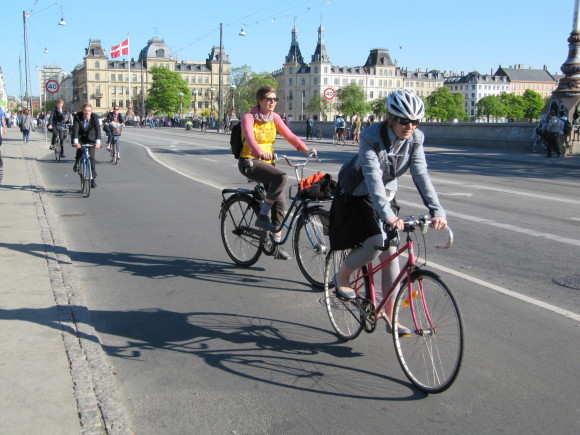
Saving 10 000 Lives While Creating 76 600 Jobs in major European Cities? – Do as the Danes Do and Use Your Bike!
At least 10 000 lives could be saved and over 76 600 job opportunities created if people in major European cities cycled as much as the citizens of Copenhagen. That is what a study published on Monday by the World Health Organization (WHO) suggests.
The researchers simulated the effect of an increase in the modal share of cycling in 54 main cities in Europe, North America and Central Asia to 26%, which is the level reached in the city of Copenhagen. The only city which had a higher modal share of cycling than Copenhagen was Amsterdam, with 33%. All the other cities will have to make substantial efforts to make their urban transport systems greener, healthier and safer and reap the benefits of the cycling economy.
More cycling makes sense ecologically and economically
The study emphasises the harmful effects of the current transport system on human health and the environment. For example, people in Europe lose about 9 months of life expectancy as a result of air pollution with particulate matter, to which transport is a major contributor. No less worrying are the effects on the climate: Transport stands for almost one quarter of total greenhouse emissions in Europe and North America. Taken together, the detrimental effects of transport on health and the environment are estimated to represent a cost of about 4% of GDP.
These figures alone would make the case for shifting towards a sustainable urban mobility system. Yet, the study also found out that increasing the modal share of cycling makes sense economically by creating at least 76 600 jobs in the cities comprised by the study.
ECF looks forward to further work on the economic assessment of the benefits of cycling
According to the WHO Regional Office for Europe and the United Nations Economic Commission for Europe (UNECE) research team, the number presented in the study is likely to be an underestimate. One reason is that it only takes into account jobs in bicycle shops, wholesale bicycle dealers and companies that design and sell bicycles. However, the job-creating potential of the cycling economy is much higher than that. It also comprises work opportunities in sectors such as bicycle rental, pedicabs, bicycle messenger companies or cycling tourism. Above all the latter would create jobs not only in big cities, but also in rural areas, which the WHO/UNECE study does not look at. Therefore, ECF would like to extend the economic assessment of the benefits of cycling to a broader range of economic activities and geographic areas. We look forward to working with our partners on this issue.
Unlocking new opportunities. Jobs in green and healthy transport. - WHO/UNECE study
About the Author
 Holger Haubold is ECF's Fiscal and Economic Policy Officer. Prior to joining ECF, he worked as a trainee at the Council of the European Union and did a Master in European Studies and Economics at ULB Brussels.
Holger Haubold is ECF's Fiscal and Economic Policy Officer. Prior to joining ECF, he worked as a trainee at the Council of the European Union and did a Master in European Studies and Economics at ULB Brussels.
- Log in to post comments
Contact the author
Recent news!
Upcoming events
Contact Us
Avenue des Arts, 7-8
Postal address: Rue de la Charité, 22
1210 Brussels, Belgium










